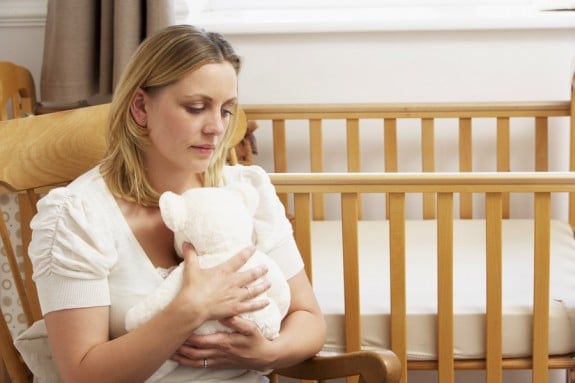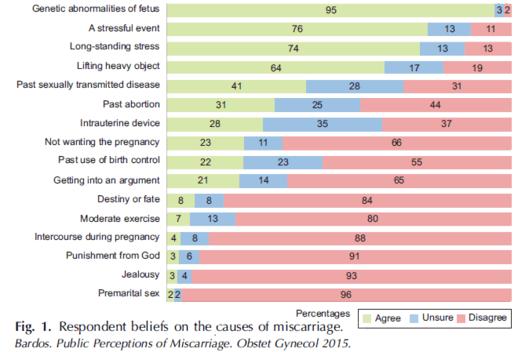Around 15 to 20 percent of all women who become pregnant will miscarry. Tragic and painful, many women struggle with seeking out support after a miscarriage, and some don’t discuss them at all. Experts believe some of this may stem from the feelings of guilt and shame, which are only further perpetuated by common misconceptions that place blame with the woman or the couple.
Researchers shed some light on these misconceptions, and their prevalence, with a study from the Albert Einstein College of Medicine/Montefiore Medical Center. Conducted by Jonah Bardos and colleagues, the study involved a 33-item survey that covered many facets of miscarriages. A total of 1,147 respondents were recruited to take the survey for $0.25 each via Amazon Mechanical Turk. Any surveys in which the respondent answered “yes” or “maybe” to “I had a fatal heart attack while watching TV” were automatically excluded from the analysis (because that would have meant they had died).
According to the results, about 55 percent of people grossly underestimated the frequency of miscarriages, guessing that they occurred in only about 6 percent of all pregnancies. The other misconceptions revolved around why miscarriages occur. Twenty-two percent of all respondents believed “that lifestyle choices such as drug, alcohol, or tobacco use are the single most common cause of miscarriage, more common than genetic or medical causes.” And, in both of these cases, men were two-and-a-half times more likely to hold these false beliefs than women.
Speaking more generally, the researchers say that lots of people believe that miscarriages are caused by things that 1) don’t actually cause them, like arguing, lifting heavy objects, having a history of STDs, or having used contraception in the past, and 2) could easily be traced back to “fault” within the woman herself.
According to Dr. Zev Williams, the survey’s corresponding author, these beliefs “were generated at a time when our thinking about health was radically different.” And, like most wives-tales and folk remedies, they’ve simply been passed down from generation to generation. This makes it very difficult to change them, which leaves us with quite a big barrier when it comes to helping and supporting women that have suffered from them.
“Because people feel [erroneously] guilty and ashamed that they had a miscarriage, they don’t discuss it,” Williams said. “This, in turn, makes those who suffer from a miscarriage feel more isolated and alone and this just perpetuates the cycle.” And, because of this barrier, “research into miscarriage is woefully underfunded and lags behind other far less common conditions.”
However, Williams believes that, in the long run, knowledge will help to dispel some of the misunderstandings. And, just like the once taboo discussions about cancer and its causes, the new knowledge and understanding will open up doors for more discussions about miscarriage.
Related Articles:
- Alcohol Consumption in First 3-4 Weeks May Have Permanent Effects on Baby’s Brain
- First Baby Born with Ground-Breaking Stem Cell IVF Procedure
- Unsupervised Home Births on the Rise, Researchers Say








